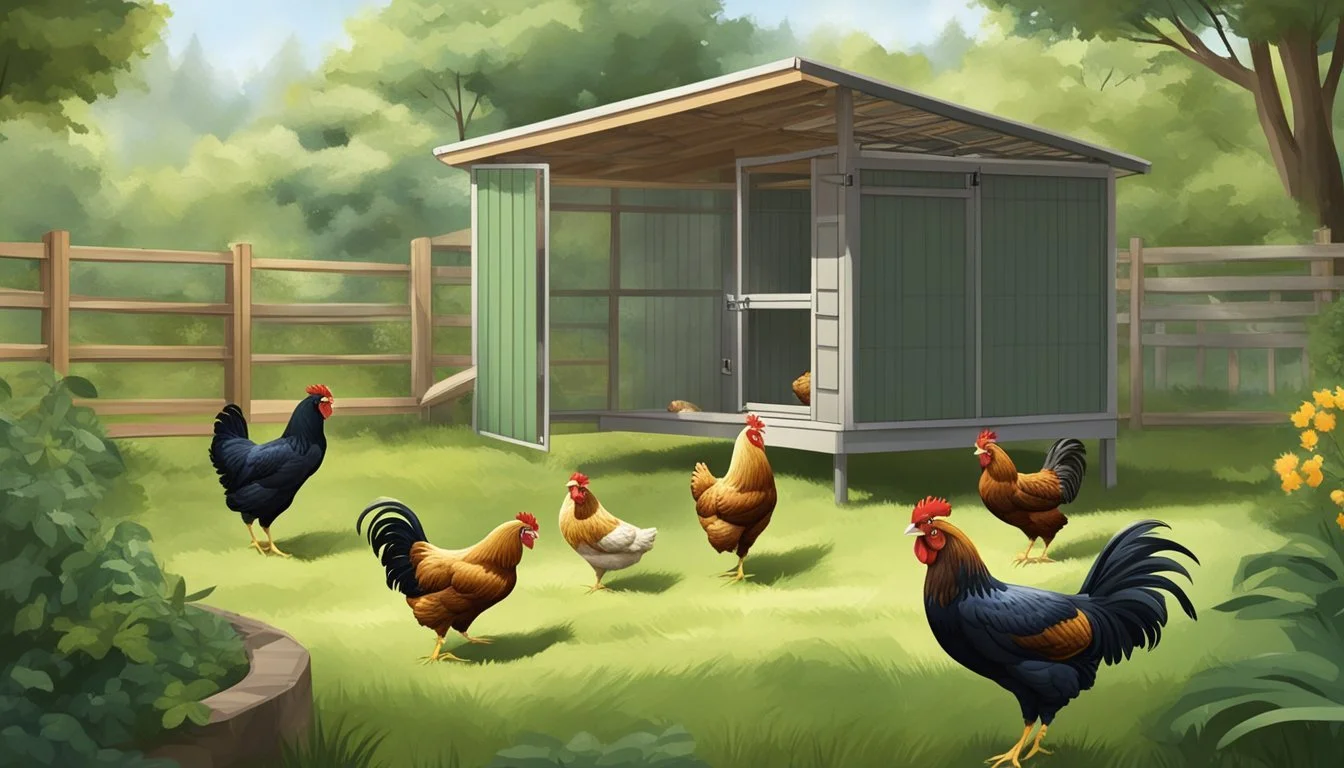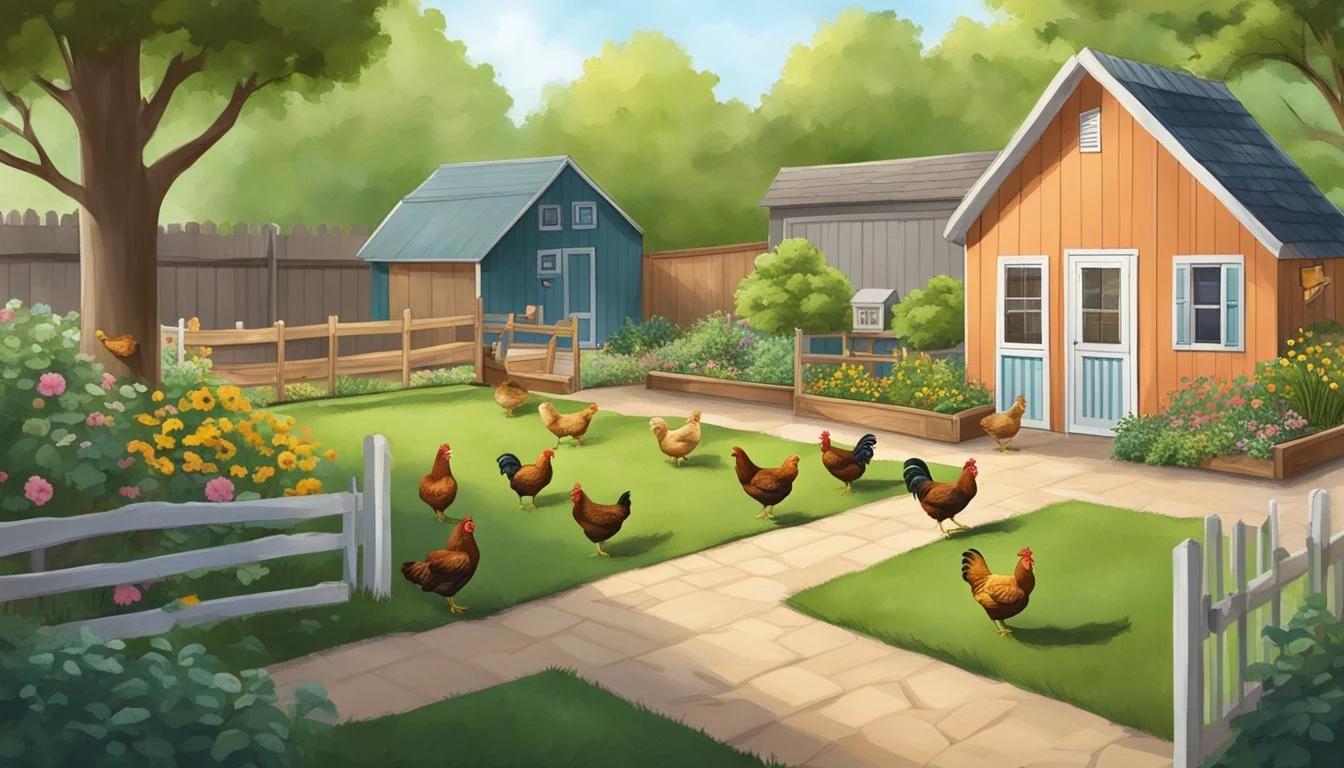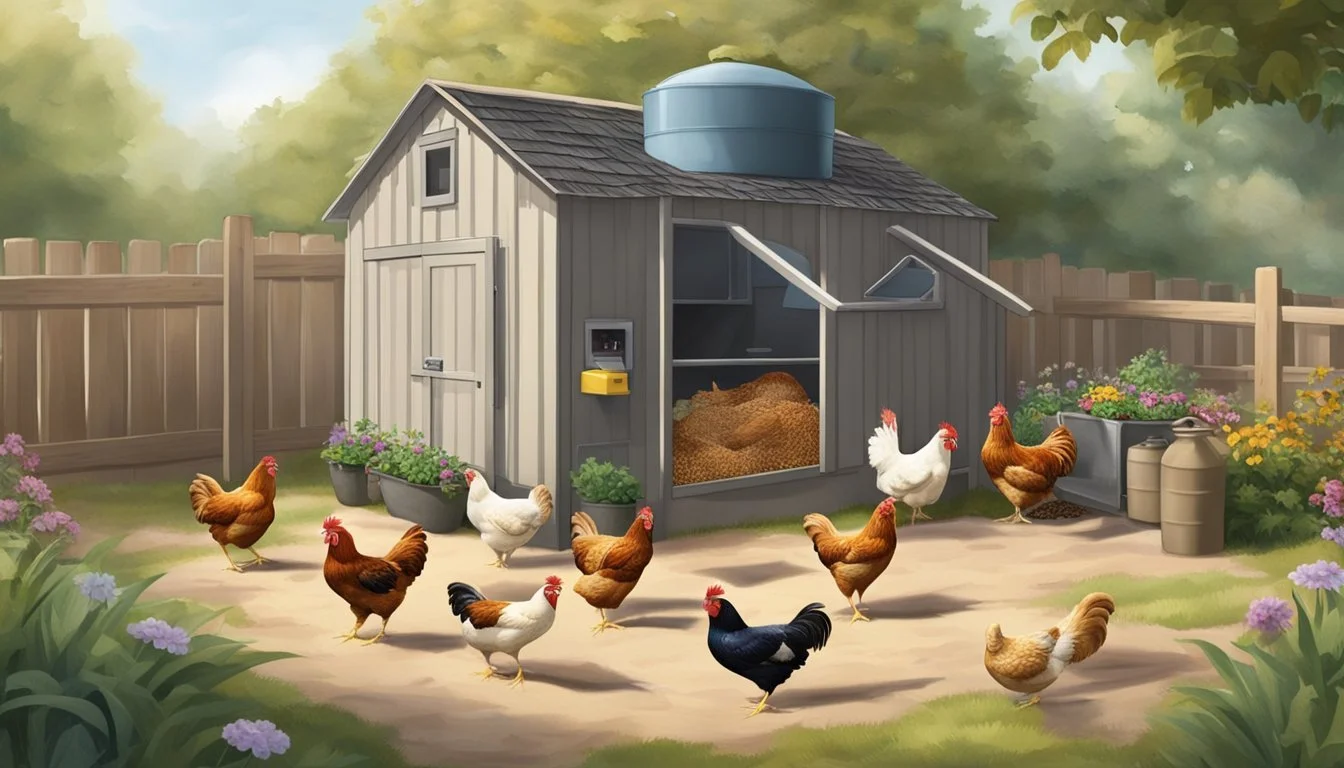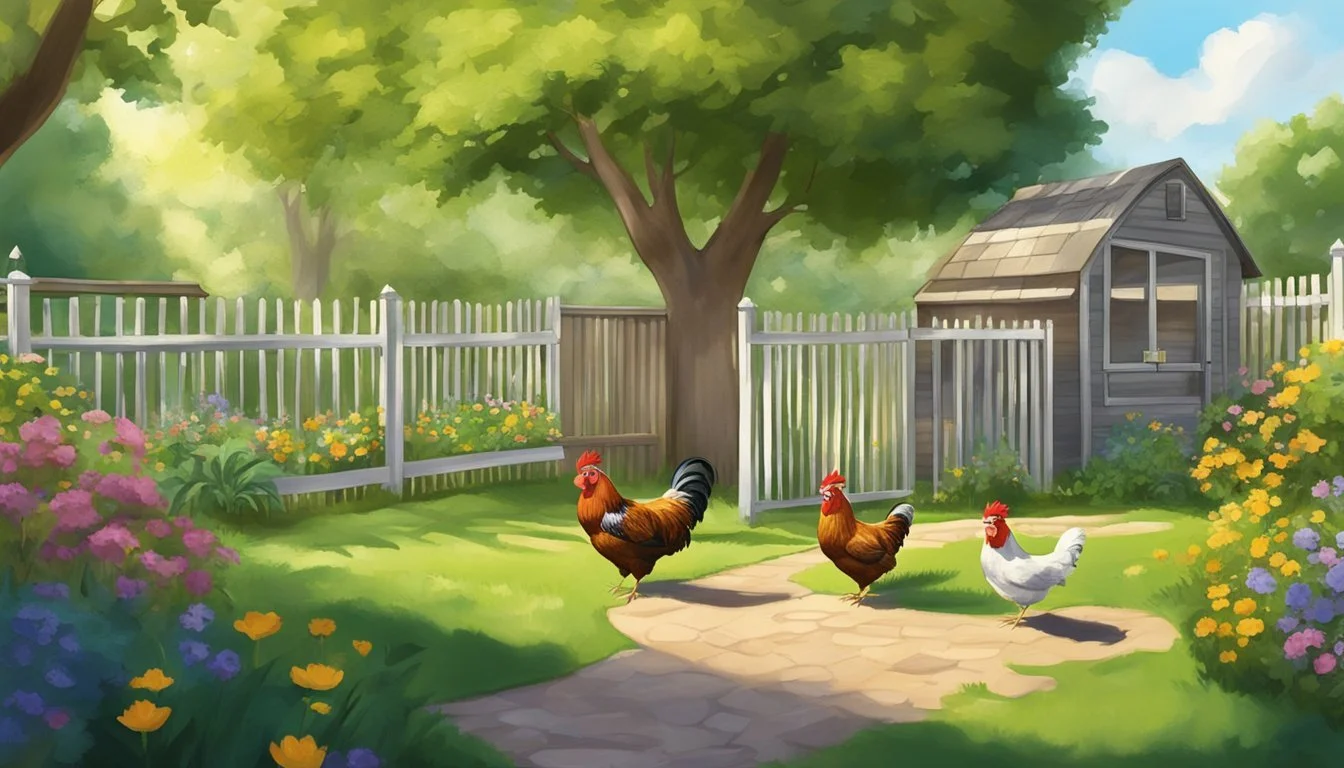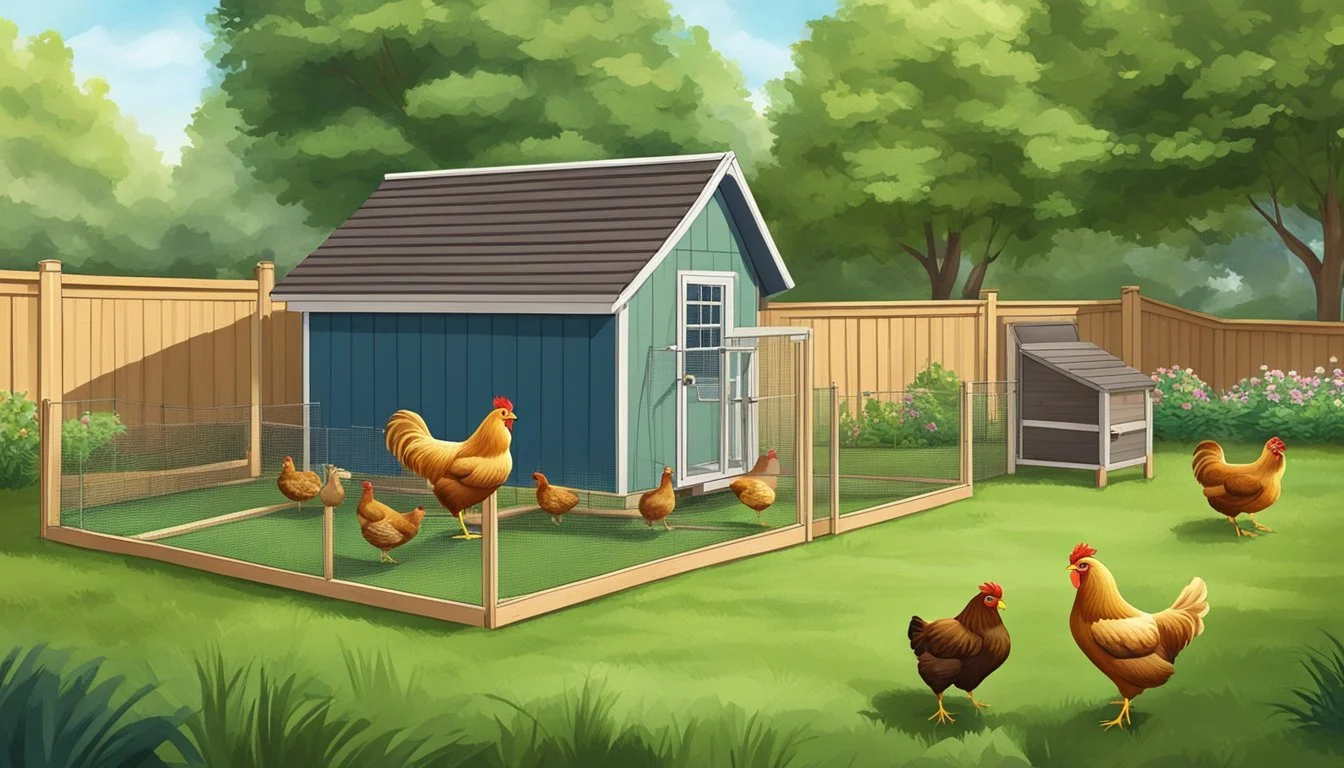Keeping Backyard Chickens in Plano, TX
Essential Tips for Urban Poultry Farming
Backyard chicken-keeping has become increasingly popular among residents in urban and suburban areas seeking a more sustainable lifestyle, and Plano, Texas, is no exception. The city's ordinance allows homeowners to raise chickens in their backyards, reflecting a growing trend toward local food production and self-sufficiency. With the city council's approval, Plano citizens have the opportunity to engage in the rewarding experience of raising chickens, which can provide fresh eggs, natural pest control, and the enjoyment that comes with caring for these animals.
However, the city of Plano has established specific guidelines to ensure that the keeping of backyard chickens does not disrupt the community. Residents are required to adhere to these rules, which are designed to maintain sanitary conditions and minimize nuisances such as noise and odors. For instance, property owners are limited on the number of chickens they can keep, and there are also stipulations regarding coop placement and maintenance.
These regulations strike a balance between the benefits of raising chickens and the need to keep the neighborhood environment pleasant for all. As residents consider adding chickens to their backyards, understanding and complying with Plano's ordinances is crucial for a harmonious and successful backyard chicken-keeping experience.
Getting Started with Backyard Chickens
For residents of Plano, TX, starting a backyard chicken flock requires understanding specific municipal regulations and learning proper care techniques.
Understanding Plano's Chicken Ordinance
In Plano, individuals looking to keep backyard chickens must navigate the city’s specific ordinances to ensure compliance. The city mandates that residents must acquire a backyard hen permit before starting their flock. This process ensures that all potential henkeepers are accounted for and following the rules set forth by the city. The zoning ordinance details that a maximum of 10 hens may be kept; however, keeping roosters is prohibited to avoid noise disturbances.
Coops must adhere to certain standards, with a mandatory requirement of at least four square feet of space per chicken. These regulations are put in place not only for the wellbeing of the chickens but also to respect the neighborhood’s sanitary and space aspects. Compliance with these regulations is non-negotiable and crucial for the legal raising of chickens in the city.
The Importance of Learning about Chicken Care
Before one embarks on the journey of raising chickens, it's imperative to understand the responsibilities that come with proper chicken care. Plano residents are encouraged to engage in educational courses or access resources offered by local animal services that provide comprehensive knowledge on chicken health, nutrition, housing, and daily needs.
These educational opportunities ensure that novice henkeepers are equipped with the necessary tools to maintain a healthy and successful backyard flock. They also minimize the risks of improper care, which can lead to health issues for the chickens and potential conflict with neighbors or the city due to mismanagement. Investing time in learning about raising chickens fosters a more fulfilling and less problematic chicken-keeping experience.
Planning Your Chicken Coop and Enclosure
Planning a proper chicken coop and enclosure is key to the well-being of backyard chickens in Plano, TX. It ensures hens have the necessary space and security to thrive without the presence of roosters, as mandated by the city's ordinance.
Coop Design and Space Requirements
A well-designed chicken coop is essential for protecting hens from predators and harsh weather. The coop should provide a minimum of 3 to 4 square feet per hen to allow for enough space to roost and move comfortably. Adequate ventilation is critical, as well, to ensure a healthy living environment, free from dampness and ammonia buildup. It is important to equip the coop with roosting bars, as chickens prefer to sleep off the ground, and nesting boxes for egg-laying — typically one box for every three to four hens.
Ventilation: Key to a healthy coop environment.
Space: Minimum of 3-4 sq ft per hen.
Nesting Boxes: One for every 3-4 hens.
Roosting Bars: Essential for proper rest.
Providing Adequate Exercise and Protection
An outdoor enclosure attached to the coop, commonly referred to as a run, allows chickens to exercise, forage, and receive sunlight which is crucial for their well-being. Secure fencing around the run not only keeps hens in but also keeps predators out. The size of the run should be at least 10 square feet per chicken to provide ample space for exercise.
Run: Minimum of 10 sq ft of space per hen for exercise.
Fencing: Must be secure to protect from predators.
Sunlight: Essential for hens' health; design the run to provide adequate exposure.
Navigating Legal and Neighborly Concerns
When keeping backyard chickens in Plano, TX, residents must address both legal regulations and the impact on their neighbors. Addressing these concerns carefully is crucial for a harmonious community experience.
Working with Homeowners Associations
Homeowners in Plano must first check with their Homeowners Associations (HOAs) to ensure that keeping chickens is permissible within their community guidelines. HOAs might have specific rules that exceed city regulations, including restrictions on the number of chickens allowed or the type of structures permissible for housing them. It is essential for homeowners to work in cooperation with their HOAs to avoid any property right disputes.
Review HOA bylaws for poultry-specific regulations.
Communicate with the HOA board to clarify any ambiguities.
Managing Noise and Odor Nuisances
City ordinances in Plano require residents to keep backyard chickens in a way that does not create noise or odor nuisances for their neighbors. This involves proper coop maintenance and limiting the number of chickens to avoid excessive noise.
Noise: No roosters are permitted, as they are typically louder and may create a nuisance.
Odors: Coops must be cleaned regularly to manage waste and prevent odors.
Following these guidelines helps ensure that all residents’ rights are respected and that keeping chickens remains a non-disruptive practice within the Plano community.
Permitting Process and Requirements
In Plano, TX, residents interested in keeping backyard chickens must navigate a specific permitting process. The City Council has set forth ordinances that require homeowners to secure permits and provide a detailed site drawing to ensure compliance with local regulations.
Securing the Necessary Permits
To keep backyard chickens in Plano, an individual must first apply for and obtain a Backyard Chicken Permit from the City of Plano Animal Services Department. The permit process includes a non-refundable fee, and applicants can opt for either a new permit or a renewal. The annual permit fee is currently set at $15.00. As part of the application, homeowners are subject to an in-home inspection by a City Enforcement Agent to determine suitability for keeping chickens.
Requirements for the permit include:
Full completion and submission of the permit application form.
Compliance with the maximum number of chickens allowed, which is 10.
Payment of the permit fee alongside the application.
Submitting a Site Drawing
A key component of the permit application is the submission of a site drawing. This is a scaled diagram of the applicant's property, illustrating the proposed location of the chicken coop and its proximity to property lines and neighboring structures.
Essential details in a site drawing:
Clear boundaries of the entire property.
Specific measurements to boundary lines.
Location of the chicken coop in relation to the house and boundaries.
Direct access points to the chicken enclosure.
Health, Safety, and Community Considerations
When maintaining backyard chickens in Plano, TX, residents must be mindful of health and safety regulations, as well as how their practice impacts the community. Compliance with local ordinances ensures the welfare of the animals and the community.
Preventing Disease and Managing Waste
Animal Shelter: Shelters for backyard chickens must be designed to prevent disease. The City of Plano requires an in-home inspection before issuing a permit, ensuring coops are well-constructed and clean.
Sanitation: Regular cleaning of chicken habitats is mandatory to manage waste and minimize odors, which can otherwise cause nuisances.
Disease Control: Proactive measures should be taken to prevent the spread of avian diseases, which could have implications during a pandemic. This includes limiting flock exposure to wild birds and practicing good biosecurity.
Contributing Positively to the Community
Residents: Keeping backyard chickens can contribute positively to the Plano community if conducted responsibly.
Complying with Local Regulations: Adhering to Plano's specific ordinances, such as limits on the number of chickens and prohibition against roosters, aligns with community standards and minimizes disturbances.
Engagement: Residents can engage in educational opportunities about responsible chicken ownership offered by local animal services, fostering community understanding and support.
Ongoing Care and Management of Backyard Chickens
Keeping backyard chickens in Plano, TX requires attentiveness to feeding, maintenance, and safeguarding against predators and weather extremes. Proper care ensures the health and productivity of the hens and the quality of the eggs they produce.
Feeding and Maintenance Routines
Reliable feeding and maintenance are crucial for the well-being of backyard hens. They should have access to a balanced diet, consisting of:
Layer pellets: A primary source of nutrition for adult hens producing eggs.
Grit: Helps in digestion and should be available in a separate container.
Clean water: Fresh water must be accessible at all times.
Maintenance routines include:
Daily: Check water and food supplies, collect eggs, and observe hens for any signs of distress or illness.
Weekly: Clean the coop to remove droppings and replace bedding materials.
Monthly: Conduct a thorough inspection of the coop for signs of wear or potential security breaches.
Dealing with Predators and Extreme Weather
Hens can fall prey to common predators such as dogs or urban wildlife. To protect them:
Secure the coop: Use sturdy materials and make sure there are no gaps larger than 1 inch.
Install fencing: A fence should surround the exercise yard to deter digging predators.
Lock-up at night: Ensure hens are locked inside the coop after dusk.
Extreme weather conditions also pose a threat. For heat:
Shade and ventilation: The coop should provide ample shade and ventilation during hot weather.
For cold:
Insulation: During winter, insulation can be necessary to protect from cold snaps.
Avoid heating lamps: Instead of heating lamps, which present a fire hazard, opt for breed selection and coop design that can naturally withstand cold temperatures.
Implementing these measures can effectively maintain the health and safety of backyard hens in Plano, TX.
Advocating for Backyard Chickens in Plano
Plano residents have shown significant interest in raising chickens at home, which has led to substantial community involvement in local governance to shape the relevant policies.
Engaging with the City Council and Commissions
Residents in Plano have actively participated in city council meetings to express their support for backyard chickens. The city council's ordinance allows property owners to keep hens, excluding roosters, underscoring a community-driven approach to urban agriculture. Advocates for the ordinance made their case by providing evidence of the benefits of backyard chickens, including sustainability and local food production, during council sessions.
The Planning and Zoning Commission also played a pivotal role, as they are integral in reviewing such proposals before they proceed to the City Council for a vote. Inclusive dialogue with these entities can be crucial for residents to influence the broader decision-making process.
Understanding the Impact of Local Legislation
When the Plano City Council approves a bill, it can significantly alter the daily lives of property owners. The approval of the backyard chicken ordinance by the council vote, with a result of 7-1, was a landmark decision for proponents. The legislation specifies conditions for keeping chickens, such as permit requirements and regulations on the animals' accommodations. Compliance with these rules ensures that the practice aligns with community standards and public health guidelines.
For residents, understanding the fine print of these regulations is essential to legally and responsibly engage in raising backyard chickens. Knowledge of the local legislation not only prevents any inadvertent legal issues but also promotes harmony within the community by ensuring that the keeping of chickens does not infringe upon the rights and comfort of other property owners.
Conclusion
Residents of Plano, Texas, have the opportunity to raise backyard chickens thanks to city ordinances facilitating this practice. Keeping chickens is permissible, aligning Plano with other Texan cities like Fort Worth and Dallas that support urban agriculture initiatives.
The specific ordinance enacted on September 27, 2021, allows for a certain number of hens—no roosters—to be kept in residential areas. This development is not only a stride toward self-sufficiency but also strengthens community connections through the sharing of resources, such as eggs.
Key Points for Plano Chicken Keepers:
Number of Hens: Only a specified number is allowed; roosters are prohibited to minimize noise.
Eggs: A flock can yield a daily supply of fresh eggs.
Sharing: Surplus eggs can be shared, fostering a sense of community.
Ordinance Compliance: Residents must comply with all regulations and guidelines set forth by the Plano City Council.
While some residents may have concerns, the consensus reflects a positive shift towards sustainable living in suburban environments. Those interested in keeping chickens should thoroughly understand their responsibilities under Plano's ordinances to ensure harmony within the community.

